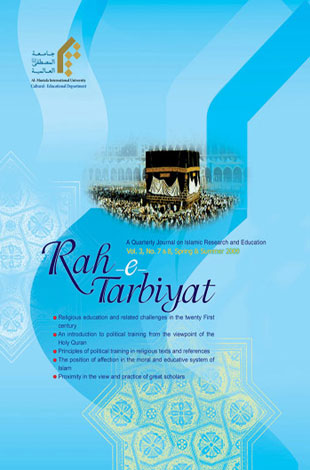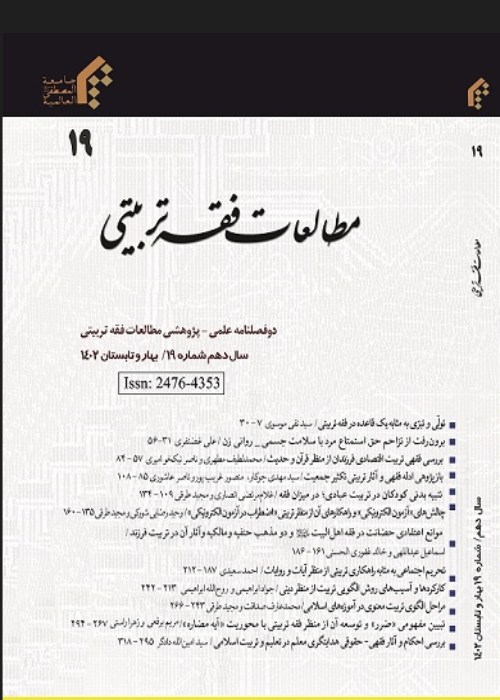فهرست مطالب

مجله مطالعات فقه تربیتی
سال سوم شماره 7 (Spring & Summer 2009)
- تاریخ انتشار: 1389/03/01
- تعداد عناوین: 9
-
Page 7
-
Page 15
-
Page 69The twenty first century has started with all its embedded challenges. These challenges have emerged in all fields. They will show their delicate and doubt raising presence in the realm of religious education accordingly. This article contains four sections: in the first part, the fundamental challenge of the twenty first century is analyzed. Then taking the proper encounter with this challenge into account, the concept of religious education will then be investigated. This investigation is done in two separate ways. In one part the issue of the «concept of education» and in the other part the «concept of religion and being religious» are examined separately. Afterwards, we focus on the elementary issues of religion and being religious and finally we propose the fundamental topic of religious education in conformity with the fore mentioned challenge
-
Page 90The most significant issue that thinkers and reformers of all countries are facing today is development and progress. Progress and development is an undeniable and essential factor in every day society. If a society intends to maintain its existence, it has no choice but to put forth effort and progress. However, the question that has obsessed so many people’s minds is that what are the key elements and factors in progress and development? In other words, how can the problems in the way of progress be alleviated and propel society toward prosperity? This article is of the opinion that the most significant and key element in prosperity is the personality and culture of the people in a society.
-
Page 126Within the process of deducing the fundamental principles of political training it becomes necessary to refer to Islamic teachings and traditions. Within this process, certain necessities are essential to understand. In this article, we will attempt to deduce and present the dominating principles within the area of political training with the help of reason and logic. Undoubtedly, comprehending the fore mentioned principles is based on specific view points and theoretical principles such as insight, existence and human psychology that will be presented within this article. An attempt will be made to present these principles as the base, guide and standard within the field of political training.
-
Page 163What is affection? To what extent is it effective? In addition to the current understanding of affection, which is actually a superficial one, does there exist a deeper meaning of affection? This article will try to clarify the point that affection is the master key in morality and religious training and can bias the direction of human life more than what the public conceives. With this view, it has been tried to make these effects clear in various dimensions.
-
Page 182During the minor and major occultation, great Shia scholars, while being inspired by the ideology of the Infallible Imams (peace be upon them), experienced very little tension when dealing with Sunni scholars. These two groups always worked together side by side and for the good of the common and united Islamic community. Shiite scholars and jurists in particular made efforts to discuss only common points that existed with the Sunnis.


